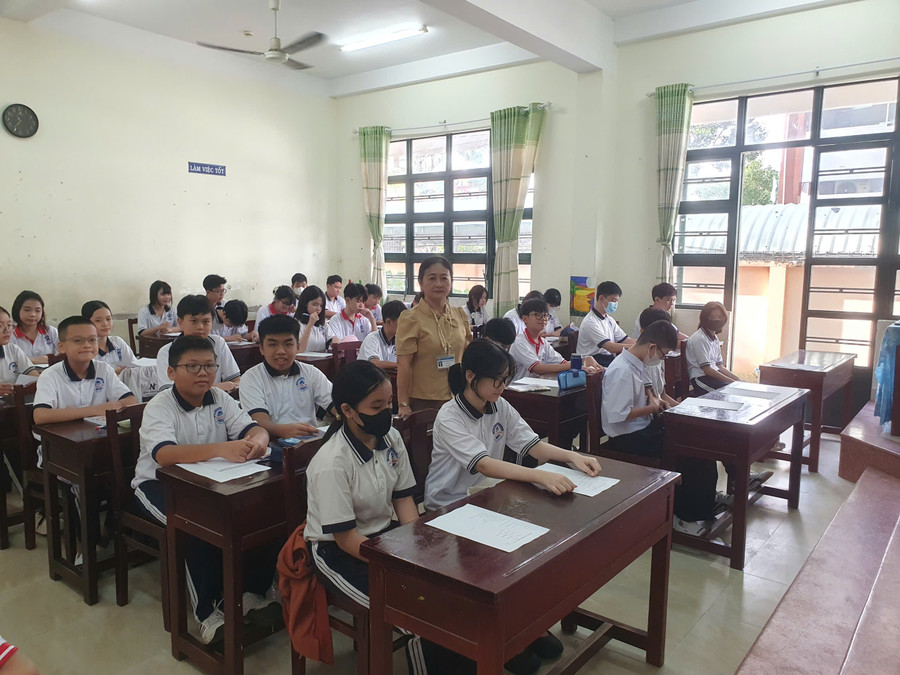In an effort to innovate educational governance, the policy of not organizing School Councils at public educational institutions and implementing the model of Party Secretary concurrently being the head in Resolution No. 71-NQ/TW is receiving consensus from education officials and teachers.
Streamlining the apparatus and eliminating overlaps in the organization helps improve leadership efficiency, ensure unity in management, and at the same time promote the direct and comprehensive role of the Party organization, especially the role of the head of the school committee. This is considered a practical step, contributing to promoting the quality of education and public and transparent management.
Mr. Nguyen Phuc Vien, Principal of Cho Gao High School ( Dong Thap province) shared that in reality, the school council model in many general education institutions today has not yet promoted its real role. The school council structure often includes representatives of local authorities, parents and students.
“Due to the nature of their busy work, government representatives often cannot follow closely, while students do not have enough capacity and experience to participate in administrative decisions,” Mr. Vien shared.
This leads to the School Council's activities being a formality, overlapping with the roles of the advisory board and the board of directors, causing waste of resources and time.
In that context, not organizing a School Council at public educational institutions is a reasonable decision, consistent with current management practices. Instead, delegating authority to the Party Secretary to concurrently hold the role of school head will help unify leadership and management, avoiding overlapping responsibilities.
According to Mr. Vien, the model of Party Secretary concurrently being the head of the educational institution helps leadership become more flexible, unified and effective. At the same time, he believes that concerns about authoritarianism are not a big problem, because the current educational management system already has many strict monitoring mechanisms.

According to Mr. Nguyen Thanh Hai, Principal of Truong Dinh High School (Dong Thap province), from the perspective of educational administration, the policy of not organizing school councils in public educational institutions not only helps streamline the organizational apparatus, but also contributes to improving the quality of leadership, creating conditions for educational institutions to focus on professional tasks.
“The School Council consists of parents and students, so at the end of the school year, the School Council often has to continuously reorganize. The School Council usually meets three times a year, but there are also extraordinary meetings to approve important matters. It is difficult for many members of the School Council to arrange meeting times, which makes it difficult to resolve issues that arise during the implementation of the school's duties and powers,” Mr. Hai shared.
Resolution No. 71-NQ/TW has set out a specific policy: Not to organize School Councils in public educational institutions (except for schools with international agreements), and at the same time to implement the model of Party Secretary concurrently being the head of the school. According to the spirit of Resolution No. 71-NQ/TW, it is not only suitable for the practical context but also contributes to streamlining the apparatus, avoiding overlapping functions and tasks. This is a necessary adjustment step to improve the effectiveness and efficiency of management, while creating conditions for educational institutions to focus more on professional tasks, improve training quality and meet the requirements of innovation in the current period.
Source: https://giaoducthoidai.vn/nang-cao-hieu-qua-quan-ly-giao-duc-trong-tinh-hinh-moi-post747678.html




![[Photo] Cambodia's Techo International Airport Officially Opens](https://vphoto.vietnam.vn/thumb/1200x675/vietnam/resource/IMAGE/2025/9/9/330836bb28ad4ee4bdd512cc1a2d0849)


![[Photo] General Secretary To Lam chaired the Politburo's working session with the Standing Committees of Party Committees of Central Party agencies.](https://vphoto.vietnam.vn/thumb/1200x675/vietnam/resource/IMAGE/2025/9/9/8343386e1e8f43c6a3c0543da7744901)

![[Photo] Politburo works with the Standing Committees of Dong Thap and Quang Tri Provincial Party Committees](https://vphoto.vietnam.vn/thumb/402x226/vietnam/resource/IMAGE/2025/9/8/3e1c690a190746faa2d4651ac6ddd01a)





























![[Photo] Politburo works with the Standing Committees of Dong Thap and Quang Tri Provincial Party Committees](https://vphoto.vietnam.vn/thumb/1200x675/vietnam/resource/IMAGE/2025/9/8/3e1c690a190746faa2d4651ac6ddd01a)
![[Photo] Politburo works with the Standing Committees of Vinh Long and Thai Nguyen Provincial Party Committees](https://vphoto.vietnam.vn/thumb/1200x675/vietnam/resource/IMAGE/2025/9/8/4f046c454726499e830b662497ea1893)






























































Comment (0)